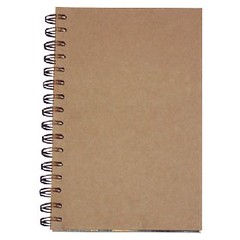 Two anecdotes on the physical nature of writing:
Two anecdotes on the physical nature of writing:
Picture the novelist Paul Auster a child in the 1950s, at a New York Giants' game. After the game is over, he gets introduced to his hero, Willie Mays. Auster asks for an autograph, and while Mays is amenable, young Paul has no pen nor paper, and the transaction cannot be completed.
A crushed Auster said that henceforth, he always carried paper and a pen. When you have a pen and paper around, of course you're going to start to write. (Auster has told this story so many times, you wonder if it's apocryphal).
I am also haunted by the story of a young writer/comedian in Chicago. He was in a taxi when the driver lost it, and went barreling off a pier into Lake Michigan, killing both driver and passenger.
When they retrieved the writer's body, they also found a notebook, in which he had written ideas for stories, stand-up routines, and scripts. He had categorized things, like "wacky band names" and "titles and dialog."
This story bothers me because it points to things unrealized, art never consummated. I don’t know how talented this writer was, but besides the sadness of a life extinguished for no reason, it is painful to think that here was a person who had ideas that he took the time to store away and categorize, ideas for which he had hopes and dreams, ideas that died with the man. 
Where ideas go to die
If I were to suffer an untimely death, with my list of hundreds of ideas unfulfilled, no one will find a notebook with them in there. They'll find them littered about like the flotsam and jetsam of my life.
As everybody knows, True Writers always carry a pen and pad, so they'll have it if the moment strikes, be it while working, commuting, or drinking. The tools of the trade should be with you, always, and never shall anything else interfere with taking notes. If so moved, you have to write when having a romantic dinner with Charlize Theron, doing the Big Nasty, or tossing a loaf; you have to write when you're sleeping or undergoing a heart transplant.
Because I am as organized as Ken Lay is honest, often I am without my pad, though my pen is always there, trusty and sure, except when it's not. (Then I steal one from strangers).
I've written down notes on the back of ATM slips, and torn scraps of newspaper. Yes, I've even written them on my arm. I've punched them into a PDA, made voice memos on my cell phone, and told Wife to remember things when we are out, such as remembering a phrase like "Flaubert, Proust, and Sartre walk into a bar."
However, while this scattershot approach does well in storing ideas, it has been rather poor in terms of efficiency. Because my time management has eroded to the point where these ideas really never are given fair treatment, I broke down and bought a notebook in which to store them all, to go along with the 10 or so already lying about my home. The first thing I wrote in the notebook was, "Do a blog on notebooks."
Writers' work habits are relatively well known, as chronicled in literary journals, magazines, and book. A Famous Writer gets up every morning at 9:15, has a double espresso, clears off her desk, reads the paper, procrastinates some more, and finally gets to work for 2 hours before lunch, and so on. Every writer has his or her rituals or schedule, to give structure to what is ultimately a disorganized, messy enterprise. 
I ain't got time for that now
But what about the proto-writing phase, the primordial ooze of braingrowth from which we generate the raw materials for our work? There are hundreds of books on How to Write, and they all say carry a notebook to write down ideas, write every day, don't fear failure and or the reaper. But few books tell you how to store, organize, and turn those ideas written on ATM slips and the insides of matchbooks into coherent narrative.
My "system" is to scribble down an idea, then transfer it to the computer later on. If the idea has to do with a particular story, just insert it directly; if not, put it into a computer file of shit that will probably never be opened until the next time I have something to type into it. That's the problem once filed away, any brilliance dies a bureaucratic death.
What I'm trying to say is that if you have such a system that shepherds thoughts into stories, you could make a lot of money writing a book about it.
Now there's an idea.
Friday, May 26, 2006
Notebooks? What Good Are Notebooks?
Subscribe to:
Comment Feed (RSS)


|